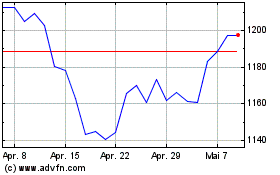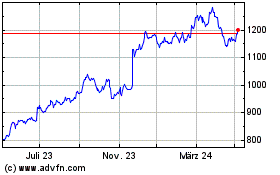Sage survey of 13,000+ businesses finds strong long-term optimism, but short-term barriers put this confidence in jeopardy
04 März 2022 - 3:00PM

Small and mid-sized businesses (SMBs) – which represent two-thirds
of global jobs and over half of global GDP – remain resilient and
confident in the face of current market challenges. However, these
companies warn of rising costs and the need for more government
support and better financing options to weather these conditions
over the next twelve months.
This is according to new research commissioned by Sage, the
leader in accounting, financial, HR, and payroll technology for
SMBs. Titled Small Business, Big Opportunity?, the
report is the largest study of its kind looking into how SMBs are
surviving and thriving despite current public health, economic, and
societal challenges – including rising costs of living and the
ongoing impact of the pandemic. Sage commissioned the study to look
at the confidence of SMBs, surveying more than 13,000 businesses
across eleven countries worldwide to understand their experience
during the COVID-19 pandemic and their outlook for the future.
Key themes that emerged from the study include:
- SMBs are a critical engine for overcoming global economic
challenges, but they are not invincible and still face
headwinds
- The majority of SMBs believe that the aftermath of the pandemic
can be an opportunity to promote more sustainable development
- COVID-19 has unleashed a new generation of toughened-up
entrepreneurs
Looking at responses from the more 2,000 U.S.-based businesses
versus the overall global average, the survey found:
- Confidence among U.S. decision-makers is higher than average
regarding the upcoming 12 months, whereby almost three quarters
(73%) feel confident about the success of their business – four
percentage points higher than the global average (69%).
- In terms of revenue over the next six months, SMB
decision-makers in the U.S. are more positive than the global
average. A majority (54%) expect their revenue to increase,
compared to just 49% on a global level.
- Moreover, 54% also expect to see their employee numbers
increase over the next year, which is significantly higher than the
global average of 46%. This includes as many as 22% who expect to
see a significant increase, while only 13% of SMBs globally expect
the same.
“The incredible contribution of SMBs to global prosperity,
recovery and growth cannot be overlooked. Similarly, their
confidence cannot be taken for granted,” said Steve Hare, Sage
Group CEO. “Governments need to keep small and mid-sized businesses
at the forefront of decision-making, and to implement policies that
knock down the barriers that stand in their way so that they can
fulfil their potential.”
“If we leave small and mid-sized businesses behind, we put the
global economic recovery at risk,” added Aziz Benmalek, Sage’s EVP
of Partners & Alliances and the interim President of Sage North
America. “Be it rising costs and inflation, skills shortages, or
lack of access to finance, we need to make sure that the businesses
at the core of the economy are given the right resources and
support to survive and thrive in the year ahead.”
Key global findings from the research include:
Rising costs and concerns about inflation are keeping
businesses up at night
- Over a third of businesses are still not operating as normal
due to the pandemic and are now facing the prospect of further
challenges
- Approximately four-in-ten businesses (39%) expect rising
inflation and cost pressures (including rising rent and utilities)
to persist as the main risks to their business in the year ahead,
significantly impacting growth prospects
- Nearly 10% of SMBs, representing more than 6.1 million jobs in
the markets surveyed, are at risk of disappearing completely
However, business confidence remains strong globally,
despite – and often because of – ongoing pandemic
pressuresMost businesses globally feel more resilient and
better prepared to overcome major barriers now than before the
pandemic because of the adaptations they have made over the period,
including investment in technology
- 69% of business decision makers feel confident that their
company will be successful 12 months from now, compared to 58% that
felt confident this time last year
- Optimism is starting to filter through into profitability, with
four in five (81%) SMBs expecting to be at least somewhat back to
pre-pandemic levels of profitability
- By sector, the businesses that are most optimistic about their
success 12 months from now are in the nonprofit, healthcare,
education, financial services, construction and technology
industries
SMBs expect to increase hiring and remain optimistic
about staffing over the next twelve months
- Nearly half (46%) of businesses surveyed expect to hire more
people in 2022 – on average, SMBs expect their workforce to
increase by 12%
- This could lead to the creation of a potential 3.8 million new
jobs, including 1.6 million jobs in the United States
- 35% of SMBs saw their workforce shrink in the previous year but
65% are confident that they will be able to meet their staffing
needs over the next 12 months
Government and financial support are crucial to business
survival
- Government support was identified as the single most important
resource to contribute to SMB growth over next 12 months (31%),
with financing (25%), including bank loans and grants, and better
management of cash flow (25%) also noted as key factors to
success
- One in five highlighted lack of government support as a key
challenge over the past twelve months
- The businesses that received government financial support (21%)
feel more resilient and better prepared than those that did not
receive funding
A majority want to seize the opportunity for more
sustainable development
- 86% of SMBs expect to make a change to become more sustainable
in the year ahead, with companies founded during COVID more likely
to make this change
- Over half of SMBs (55%) identified sustainability as being
important to their business, with 17% describing it as central to
what they do
- Around 80% are feeling pressure to reduce their environmental
impact, with pressure coming from customers (31%), the government
(25%), employees (24%) and the supply chain (22%)
- A majority of SMBs believe that the aftermath of the pandemic
can be an opportunity to promote more sustainable development in
their countries and local communities
Out of the darkness, a new generation of confident
business owners has emergedBusinesses founded during the
pandemic report larger-than-average barriers to success, but remain
more confident about the growth they can achieve in the upcoming
year
- 42% of businesses founded during the pandemic were by young
people (aged 18-34), with the principal decision makers more likely
to be men (61%)
- These ‘Generation COVID’ businesses are much more adaptable,
with less than one-third stating that the pandemic negatively
impacted their operations
- These ‘Generation COVID’ companies are more confident they will
generate revenue growth in the next six months (57%) vs. those
founded pre-pandemic (48%)
- However, in comparison to businesses founded pre-pandemic,
fewer ‘Generation COVID’ SMBs are satisfied when it comes to their
current staffing levels (56% vs. 65%), ability to recruit talent
(51% vs. 58%), and productivity (58% vs. 68%)
Survey Methodology A specialist research team
from Portland Communications conducted an online survey involving
13,118 SMB decision makers between November 25 and December 2,
2021. The markets included as part of this study are in the UK,
U.S., France, Spain, Germany, Canada, Australia, South Africa,
Portugal, Malaysia, and Singapore. In each market, decision makers
at businesses employing fewer than 250 people were targeted.
Portland Communications’ online polling studies are accredited
by the British Polling Council. All data gathered is of a
publishable quality.
Click here to access to the full report and regional
findings.
Media contact:Peter
Olsonpeter.olson@sage.com408-878-0951
About SageSage exists to knock down barriers so
everyone can thrive, starting with the millions of small- and
mid-sized businesses served by us, our partners, and accountants.
Customers trust our finance, HR, and payroll software to make work
and money flow. By digitizing business processes and relationships
with customers, suppliers, employees, banks, and governments, our
digital network connects SMBs, removing friction and delivering
insights. Knocking down barriers also means we use our time,
technology, and experience to tackle digital inequality, economic
inequality, and the climate crisis. Learn more at
www.sage.com/en-us/ and www.sageintacct.com.
Sage (LSE:SGE)
Historical Stock Chart
Von Mär 2024 bis Apr 2024

Sage (LSE:SGE)
Historical Stock Chart
Von Apr 2023 bis Apr 2024
